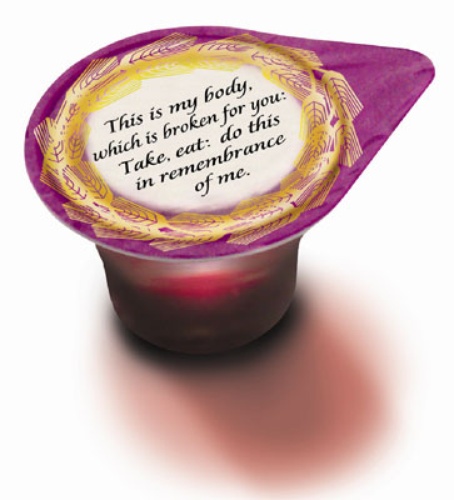 I had just shown to a friend of mine a page in a catalogue that was selling “communion wafer and juice sets.” According to the ad copy, churches purchasing these sets gain “the convenience of offering the elements of communion in one easy to use container.” These sets are a combination of “communion juice and wafer in an airtight double sealed package to extend shelf life and ensure freshness.” Her response: “I think it is tacky.”
I had just shown to a friend of mine a page in a catalogue that was selling “communion wafer and juice sets.” According to the ad copy, churches purchasing these sets gain “the convenience of offering the elements of communion in one easy to use container.” These sets are a combination of “communion juice and wafer in an airtight double sealed package to extend shelf life and ensure freshness.” Her response: “I think it is tacky.”
What a sanitized world we live in! Between “the sky is falling” swine flu epidemic to new instructions on how sneeze (into one’s elbow, please, NOT one’s hand), to the nastiness of MRSA and the realization that thousands and thousand of people die in hospitals, NOT because of their original complaints but because they pick up infections there, it is a wonder that any of us even shake hands with anyone else without immediately cleansing ourselves again afterward.
I recently read an article on how disgusting church microphones are because the users actually breathe on them when speaking or singing. Of course, the writers of that article were suggesting that, as a regular user of a church sound system, I might want to purchase my very own microphone, at significant cost, of course, rather than letting some other highly germinated person use mine or me use someone else’s.
But to go back to the communion sets . . . when we observe the Lord’s Supper at church, we tear pieces off a common loaf of bread and then people dip those pieces into a common cup before consuming them. It is the commonality that is so important. We often sing, “We are One Body” when engaging in this special act. We are connected to one another, we share a meal, we come together to receive it. This service of communion must be celebrated in a group setting–it can’t be done alone. There are intentional responses back and forth as we all affirm together the greatness of God and the mystery of our faith.
Are the communion juice and wafer sets “tacky.” Yes, when fear and commerce (they are also expensive) push their production; no, when they may on occasion be a common sense response to an emergency situation.
Keep in mind that fear will quickly drive us all apart, just as fear of infection drives the common act of holy communion into the neatly packaged juice and wafer sets. Fear so isolates us that we learn to live not trusting others, putting up barriers, refusing entrance into our homes and lives and interiors those who might change us or threaten us.
Is it possible to live a sanitized life in isolation from other human beings? People are messy–so if we can keep them at a distance, perhaps our own lives will be less vulnerable to infection from others. However, ultimately, all of us have to recognize that our own lives are messy, too. Every one of us wanders from darkness to light and back again. We can move in a single moment from glorious generosity to tight meanness of soul and pocketbook. We can, and we do, both love and hate those with whom we are in closest contact.
Certainly, modern sanitation saves millions of lives. I don’t want to go back to drinking dirty water or having open sewage flowing in the streets. But I often wonder if this same fear that keeps people we don’t know or who are significantly different from us at a distance also keeps the Spirit of God at a distance. It is impossible to enter into contact with true holiness and not feel threatened. Always remember that the first things angels say when encountering mere mortals is, “Do not be afraid.”
I believe the choice to leave fear behind is a choice that opens to us the possibility of heaven. And that’s where I want to live.












